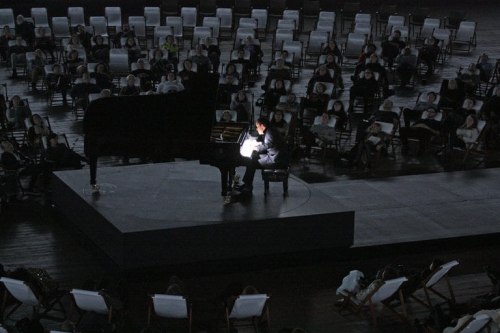
Igor Levit performing in “Goldberg” at the Park Avenue Armory. Hiroyuki Ito for The New York Times
Alert: spoilers below. Classical music critics don’t get many chances to write those words. But the artist Marina Abramovic and the pianist Igor Levit have guarded certain aspects of “Goldberg,” their production of Bach’s “Goldberg” Variations, which opened on Monday at the Park Avenue Armory. So those who like their art with every surprise intact should read no further.
But this stark, severe staging would retain its impact, I think, even with its details revealed, just as knowing the “Goldberg” Variations backward and forward doesn’t ever take away that sprawling solo- piano masterpiece’s twists and turns. Musical performances are tricky that way: You can’t always predict the effects they’ll have on the mind and body.
The performance artist Marina Abramovic and the pianist Igor Levit at the Park Avenue Armory.Marina Abramovic and Igor Levit’s Variation on ‘Goldberg’ Will Make the Audience Earn Its BachDEC. 2, 2015 Ms. Abramovic is an old hand at such effects. Known for performances of punishing endurance, like the 750 hours she sat in the Museum of Modern Art’s atrium for the 2010 retrospective “Marina Abramovic: The Artist Is Present,” she reminds us of the body’s vulnerability and durability.
Over the past few years, she has become less performer than guru, coaching others in the Abramovic Method, intended to increase attentiveness and encourage, as she writes in the program, a sense of being “present.” She doesn’t appear in “Goldberg,” a grand demonstration of her method and also a hodgepodge: part Luddism, part concentration exercise, part stylized spectacle. It falls to Mr. Levit, who juxtaposes the Bach with variations by Beethoven and Frederic Rzewski on a new recording, to make those elements cohere. He does his very best.
Audience members are directed to place their electronic devices in lockers: The thought is that even a silenced phone retains its hold on you, preventing the full focus Ms. Abramovic aims to foster. Inside
the soaring drill hall, cloth deck chairs have been arranged around one end of a long runway. A gong rings, and you put on a pair of noise-canceling headphones.
In the dense ensuing silence, you let your mind drift. I dozed briefly; experienced a few moments of deep, uncanny calm; and contemplated Mr. Levit, who sat at the piano as it slowly sailed down the runway on a moving platform, his fingers occasionally testing out a passage against his thighs. More than 30 minutes passed before he arrived at our end of the runway, the gong sounded again, and he began.
It was not an unpleasant half-hour. But I’m not sure if it much shaped my experience of Mr. Levit’s full- throated performance, superbly balanced and varied — playful yet wary in the seventh variation, organ- like in the 12th — yet suffused with unifying narrative momentum. His hands illuminated by a strip of light above the keys, Mr. Levit played as the piano rotated a single revolution over the course of the 75- minute work: It was as if Robert Wilson had collaborated with Liberace.
Mr. Wilson’s influence is clear in the sternly glamorous staging’s glacial pace and its approach to lighting (designed by Urs Schönebaum), which manages to be both clinical and poignant. The piano had rotated such that Mr. Levit played the spacious 25th variation with his back directly to me, his body silhouetted against the light over the keys while a thinner slice of light, stretching around the perimeter of the drill hall, grew fainter in the distance. The effect was stunning.
But I kept returning to that luxuriously quiet half-hour prelude. Never before had I considered silence as a commodity, one far more accessible to wealthy New Yorkers than to poor ones. Reclining in their deck chairs, the members of the audience evoked the denizens of the sanitarium on Thomas Mann’s magic mountain, fiddling with self-improvement and cultural appreciation as the world burns below.
In this, “Goldberg” is an exaggeration of, but no real departure from, the standard concert experience. Too often, classical music encourages escape from whatever is outside the hall — usually euphemized as “distraction” — rather than engagement with it. The rhetoric surrounding Lincoln Center’s annual White Light Festival also speaks to New Age values of yoga spirituality and personal development — “the time to connect to ourselves,” as Ms. Abramovic puts it — rather than more outward-facing political or social awareness.
Ms. Abramovic showed that awareness in her heady early works of the 1970s. Her actions then were defiant, pungent; now she seems resigned to languorous withdrawal.
What remained pungent — also lush, vibrant, sensitive — on Monday was Mr. Levit’s playing, amplified by the staging into something cosmic while retaining a tender human pulse. As the audience gazed toward the hall’s vast arched ceiling, Bach was lent some of the childlike wonder of a planetarium star show. An evening that could have — should have — felt ridiculous was instead, when you didn’t think too much about it, strangely enchanting.